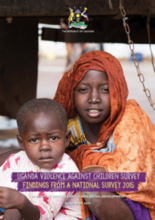Executive Summary
The Uganda Violence Against Children Survey (VACS) provides nationally representative data to inform policies and programming aiming to end violence against children in Uganda. Moreover, the Uganda VACS is the first global Violence Against Children Survey to provide regional level data, allowing for even more targeted programmatic implementation. The VACS includes detailed information revealing Ugandan children’s experiences of sexual violence, physical violence, and emotional violence. This data incorporates overall prevalence of each type of violence, relationship to perpetrators, time and place of the incident, the health and behavioral consequences resulting from violence, and children’s service knowledge and uptake. The VACS also contains extensive information on several other relevant VAC-related issues, including the overlap of different types of violence, health risk behaviors of children and youth, HIV knowledge and testing behaviors, and attitudes towards gender and intimate partner violence (IPV).
A total of 5,804 children and young people completed interviews, 3,159 females and 2,645 males. For data analysis purposes, respondents were separated into two groups, Ugandans aged 13-17 years and 18-24 years. Responses were disaggregated by sex and analyzed independently. Data are reported from 18-24 year olds regarding their experiences of violence before the age of 18, creating data detailing the lifetime childhood experience of violence in Uganda. Data are reported from 13-17 year olds about any experiences of violence suffered during the previous year, allowing for analysis of the current experiences of Ugandan children. This also enables identification of patterns and trends relating to children’s experience of violence.
The Uganda VACS would have not been possible without the partnership and cooperation of the Ministry of Gender, Labour, and Social Development (MGLSD); the Uganda Bureau of Statistics (UBOS); the AfriChild Centre for Excellence, ChildFund, and Makerere School of Public Health (MakSPH); TPO Uganda; the U.S. Centers for Disease Control and Prevention (CDC); UNICEF Uganda; the President’s Emergency Plan for AIDS Relief (PEPFAR); the United States Agency for International Development (USAID); the Together for Girls Partnership; and the Wellspring Foundation.

